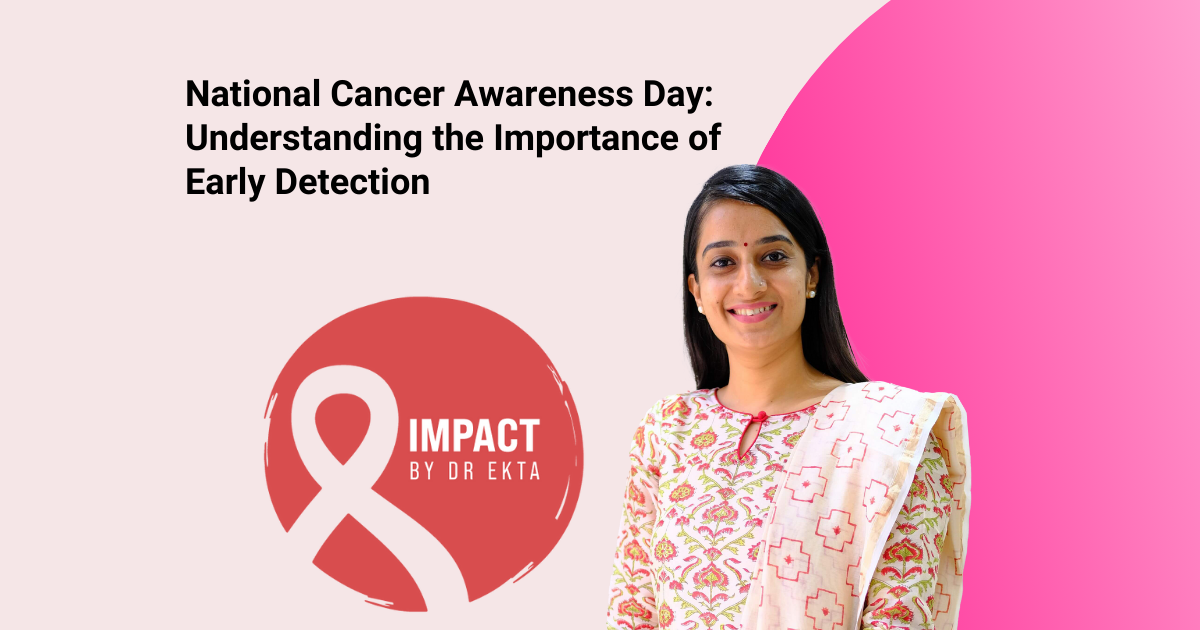As an oncologist, I’ve witnessed how powerful knowledge and early action can be in the fight against cancer. This National Cancer Awareness Day, I’d like to focus on why awareness, regular screenings, and breaking the stigma surrounding cancer are essential. Cancer is a complex condition, with over 100 types affecting different parts of the body, and it impacts not only the physical health of patients but also their emotional and mental well-being. Despite its challenges, our understanding and ability to treat cancer are stronger than ever before.
Why Early Detection is Essential
Cancer develops when cells grow uncontrollably, and the earlier we catch this process, the easier it is to control and treat. Early detection of cancer significantly improves treatment outcomes. For instance, the five-year survival rate for breast cancer is around 99% when caught early. Likewise, cervical cancer is highly treatable if detected at an early stage, often even preventable through regular screenings and the HPV vaccine.
The importance of early detection cannot be overstated. Here are a few types of cancer where early detection can make a life-saving difference:
- Breast Cancer: Regular mammograms can detect breast cancer at an early stage, allowing for more effective and less invasive treatments. In India, breast cancer is the most common type of cancer in women, and annual screenings for women over 40 can make a significant impact.
- Cervical Cancer: With regular Pap smears and HPV vaccines, cervical cancer can often be prevented or caught early. In fact, in recent years, the mortality rate from cervical cancer has dropped substantially in countries with widespread screening and vaccination programs.
- Colorectal Cancer: Colonoscopies and other screenings can help detect colorectal cancer early, reducing the need for extensive surgeries and more aggressive treatments.
These are just a few examples. Cancer affects nearly every system in the body, which is why screenings for common cancers such as prostate, lung, and colorectal are essential to improving survival rates.
Key Statistics That Highlight the Importance of Awareness and Screening
- Lifetime Risk: Statistics indicate that one in every two men and one in every three women may face a cancer diagnosis at some point in their lives.
- Impact of Early Detection: When cancer is detected early, it greatly improves the chances of survival. For example, early-stage breast cancer has a 5-year survival rate of 99%, while cervical cancer caught early has a similarly high survival rate.
- Progress in Treatment: Advancements in research and treatment over recent decades have increased the survival rate for childhood cancer by over 50%, highlighting the power of medical progress when coupled with early diagnosis.
The Mental and Emotional Impact of Cancer
Beyond its physical toll, cancer affects every aspect of a patient’s life, including their emotional and mental health. Many patients struggle with feelings of isolation, anxiety, and depression, and the stigma around cancer can often add to these challenges. Some patients feel they can’t openly talk about their condition, fearing judgment or pity. This isolation can impact a patient’s overall recovery and quality of life.
Breaking the stigma around cancer is crucial. Support systems—both personal and within the healthcare system—play a vital role in helping patients cope emotionally and mentally. Loved ones, support groups, and healthcare providers can help patients feel less isolated, more empowered, and better able to handle the ups and downs of treatment.
What Can You Do During Cancer Awareness Week?
- Get Screened: The first step to fighting cancer is to get screened regularly. Screenings and early detection can often mean the difference between highly treatable early-stage cancer and a more challenging diagnosis.
- Educate Yourself and Others: Learning about the symptoms of various cancers, such as lumps or unusual bleeding, can help individuals recognize potential warning signs early on. Share what you know with friends and family, and encourage them to get regular screenings.
- Encourage Healthy Habits: Lifestyle changes can reduce cancer risks. Quitting smoking, limiting alcohol, maintaining a healthy diet, and exercising regularly can significantly reduce one’s risk of developing certain cancers.
- Support a Loved One or Group: Cancer awareness also means supporting those who are currently fighting cancer. Reach out to a friend, family member, or support organization, as a little compassion can make a big difference.
A Future of Hope and Progress
With ongoing advances in cancer research, there is hope for even more effective treatments and possibly even cures in the future. Immunotherapy, targeted treatments, and other innovative therapies are already improving outcomes for many patients. But awareness remains a crucial part of this journey. By staying informed and proactive, we can all contribute to a future where cancer is far less daunting, and far more manageable, than it is today.
Breaking the Silence, One Conversation at a Time
This National Cancer Awareness Day, I urge you to have open conversations about cancer. Talk with your family about the importance of screenings, know the symptoms to watch out for, and encourage loved ones to take care of their health. By fostering a supportive, stigma-free environment, we help patients feel stronger and more empowered to fight their battle.
Let’s use this week to deepen our understanding, spread awareness, and support one another. Together, we can create a future where early detection, improved treatment, and a strong support system make a lasting impact on cancer care.
Thank you for reading, and remember, you are not alone in this journey.
Tags:
BreakTheStigma, CancerAwareness, CancerPrevention, CancerScreening, CancerSupport, CancerSurvivors, DrEktaValaChandarana, EarlyDetection, FightAgainstCancer, HealthAwareness, HopeAgainstCancer, KnowTheSigns, oncology, SupportCancerPatients, NationalCancerAwarenessDay

